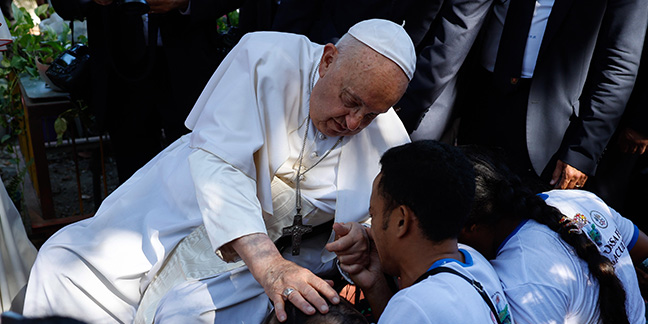 DILI, Timor-Leste — In a predominantly Catholic country where clergy are treated with great respect, they must make extra efforts to remain humble servants of their people, Pope Francis told the priests of Timor-Leste.
DILI, Timor-Leste — In a predominantly Catholic country where clergy are treated with great respect, they must make extra efforts to remain humble servants of their people, Pope Francis told the priests of Timor-Leste.
Respect "should not make you think of your ministry as bestowing social prestige, acting as leaders who crush others," the pope said Sept. 10 during a meeting with bishops, priests, religious and catechists in Dili's Immaculate Conception Cathedral.
"The gesture that the faithful make here when they meet priests is meaningful: they take your consecrated hand and bring it close to their foreheads as a sign of blessing," the pope said. "It is beautiful to see in this gesture the affection of God's holy people, for the priest is an instrument of blessing. Never take advantage of this role. You should always bless and console; always be a minister of compassion and a sign of God's mercy."
Pope Francis arrived at the cathedral after visiting the Irmas Alma School and their students, who are seriously ill or have severe disabilities.
After gently shaking hands with some of the children and caressing the cheeks of others, Pope Francis told the sisters and other staff that when Jesus spoke about the final judgment, he said the blessed are those who fed, clothed, cared for and visited him when they did so for others.
"I call this the sacrament of the poor. It builds and reinforces," he said. "And one cannot understand this without love."
And then pointing to a little boy named Silvan, the pope said people have much to learn from the children at the home. "We have to learn to let ourselves be cared for, as they teach us, to let ourselves be cared for by God."
"Look at his face; he's sleeping peacefully, and just as he allows himself to be cared for, we must let ourselves be cared for," he said.
At the cathedral, Florentino de Jesus Martins shared his story with Pope Francis. Parkinson's disease forced the 89-year-old to retire seven years ago after more than 60 years as a full-time catechist.
"I often had to walk from 6 to 10 kilometers (4-10 miles) in order to catechize. Along the way, I sometimes faced challenges such as rain and strong wind, or overnight stays during the journey," he said. "Despite the challenges, I was never discouraged, and I continued to work with the utmost responsibility, zeal and devotion."
When he finished speaking, Pope Francis quipped, "This man gives the Apostle Paul a run for his money!"
In his main talk to the churchworkers, the pope used the image of Timor-Leste's famous sandalwood trees and their fragrance, comparing it to the fragrance of the Gospel that gives joy to every home and every heart.
"Evangelization occurs when we have the courage to 'break' the jar containing the fragrance, breaking the 'shell' that often closes us in on ourselves, of leaving behind a lazy and comfortable religiosity that only serves our personal needs," he said.
Canossian Sister Rosa Sarmento had told the pope that the church in Timor-Leste was an "outgoing" one, full of vocations to the priesthood and religious life and sending missionaries to countries around the world.
"I liked the expression that Sister Rosa used in her testimony," he said, "a church on the move, a church that does not stand still, does not revolve around itself, but burns with passion to bring the joy of the Gospel to all."
"In particular, the fragrance of the Gospel must be spread in order to counter anything that humiliates, disfigures or even destroys human life; to counter those plagues that cause inner emptiness and suffering such as alcoholism, violence and disrespect for the dignity of women," the pope said.
He was greeted with strong applause when he asked the religious women present to be "mothers of the people of God."
Four sisters from the U.S.-based Maryknoll Missionaries traveled from their home in Aileu, southwest of Dili, to join some 2,000 other bishops, priests, religious and catechists in the cathedral.
Sister Hyunjung Kim, a social worker who has been in Timor-Leste for nine years, said she was particularly pleased about Pope Francis' emphasis the night before on the importance of education because that is the one thing that will help the nation's women and girls.
"Here early marriage is common; girls can marry as soon as they start menstruating, and they have babies at 15," she said. Their schooling ends, and "they do not know their rights."
The tradition of "hola" or a "bride price" is still very common, she said. It often is more than a dowry; "they buy the girl. And if there is sexual abuse, the offender pays the 'hola,' and the family saves face" with no regard for the girl.
"That is why, for me, it is all about education," Sister Kim said.
In addition to education and health care in Aileu, the Maryknoll sisters teach gardening and crafts that can help local women make money.
Maryknoll Sister Susan Wanzagi, who teaches gardening, said, "To empower women, they have to have a skill. If the husband is always giving and the woman always receiving, she will always be second. But if they both contribute, they are equal."
— Cindy Wooden, Catholic News Service


